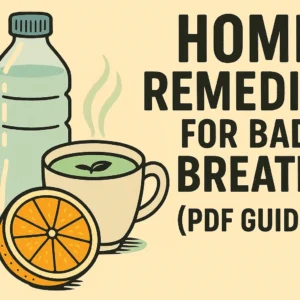Introduction
We’ve all had moments of bad breath, after a garlicky meal or when you wake up in the morning. But when bad breath becomes a constant companion, it can take a real toll on confidence and social comfort.
Chronic bad breath isn’t just a minor inconvenience, it’s often a sign of deeper health or hygiene issues. Whether you’ve dealt with it yourself or know someone who has, understanding the root causes and solutions can make a big difference.
What Is Chronic Bad Breath?
Chronic bad breath is persistent odor coming from the mouth that doesn’t go away with regular brushing, flossing or mouthwash. It lingers for weeks or even months and often returns shortly after temporary fixes.
While occasional bad breath is common, constant bad breath is not. It can signal underlying issues that need attention.
Dentists and doctors refer to it as halitosis, which is the medical term for bad breath. But the experience is the same: a noticeable, often embarrassing odor that can be difficult to manage without targeted action.
Common Causes of Chronic Bad Breath
1. Poor Oral Hygiene
Neglected brushing or flossing allows food particles to stay in the mouth, breaking down and releasing foul odors.
Bacteria accumulate on the tongue and between teeth, producing sulfur compounds. Which is the main culprits in persistent bad breath.
2. Dry Mouth
Saliva helps cleanse the mouth. When your mouth is dry because of dehydration, medications or breathing through your mouth. Odor-causing particles aren’t washed away efficiently.
This creates a perfect environment for chronic bad breath.
3. Dietary Choices
What you eat doesn’t just affect your health, it also plays a direct role in chronic bad breath. Certain foods and eating patterns can cause odors that linger long after meals, even with good oral hygiene.
4. Tobacco and Alcohol
Smoking and chewing tobacco dry out the mouth and leave lingering odors. Alcohol, especially in excessive amounts, does the same.
Both also increase the risk of gum disease, a known trigger of chronic bad breath.
5. Underlying Medical Conditions
When bad breath doesn’t seem connected to oral hygiene or diet, it may stem from health conditions like:
- Sinus infections and postnasal drip
- Gastroesophageal reflux disease (GERD)
- Uncontrolled diabetes (can lead to a fruity or acetone-like odor)
- Liver or kidney disease
Negative Effects of Chronic Bad Breath
The impact goes beyond physical symptoms. People with chronic bad breath often experience:
- Social withdrawal or anxiety in close-contact settings
- Decreased self-esteem
- Hesitation in romantic or professional relationships
Many suffer in silence, fearing judgment or embarrassment, but the issue is far more common than most realize.
When to Seek Help
If bad breath lasts more than a few weeks despite good hygiene and lifestyle habits, it’s time to talk to a professional. Dentists can often detect signs of gum disease or infection, while doctors evaluate for other medical causes.
In some cases, breath analysis machines or lab tests can be used to measure odor-causing compounds.
How to Get Rid of Chronic Bad Breath
Brush and Floss Daily
Clean your teeth twice a day and floss at least once. Use a soft-bristle toothbrush and fluoride toothpaste. Don’t forget the tongue, especially the back, where odor-causing bacteria thrive.
Scrape Your Tongue
Use a tongue scraper or the back of a toothbrush to remove the white coating that often forms. This simple habit can drastically reduce bad breath.
Rinse with the Right Mouthwash
Choose alcohol-free mouthwashes that contain antibacterial agents like chlorhexidine or cetylpyridinium chloride. These reduce bacteria without drying out your mouth.
Stay Hydrated
Drink plenty of water throughout the day. Chewing sugar-free gum or sucking on xylitol-based lozenges can also stimulate saliva.
Quit Smoking
Tobacco damages gums and stains teeth. It also dries out the mouth. All contribute to chronic bad breath.
See Your Dentist Regularly
Professional cleanings and checkups can catch issues like plaque buildup or gum disease early, preventing odor from becoming a long-term problem.
Address Medical Conditions
If your dentist rules out oral causes, follow up with a doctor to explore other potential issues that could be contributing to chronic bad breath.
Common Myths About Bad Breath
- “Mint always fixes it.” Mints and gum can mask odors temporarily, but they don’t treat the root cause.
- “Only people with poor hygiene have it.” Even diligent brushers can struggle with chronic bad breath if the cause is medical or dietary.
- “Mouthwash cures everything.” Many over-the-counter rinses offer a short-term solution and may even dry out the mouth, worsening the problem.
Conclusion
Chronic bad breath is more than a minor physical annoyance. It’s a persistent condition that can have emotional and social consequences. The good news? In the majority of cases, it’s reversible with the right habits and attention.
If you’re dealing with it, don’t stay silent or rely on mints alone. Start with a closer look at your oral care routine and don’t hesitate to reach out to professionals for support.
Everyone deserves to speak and live without worry. Tackling chronic bad breath is a step toward greater confidence and better overall health.


